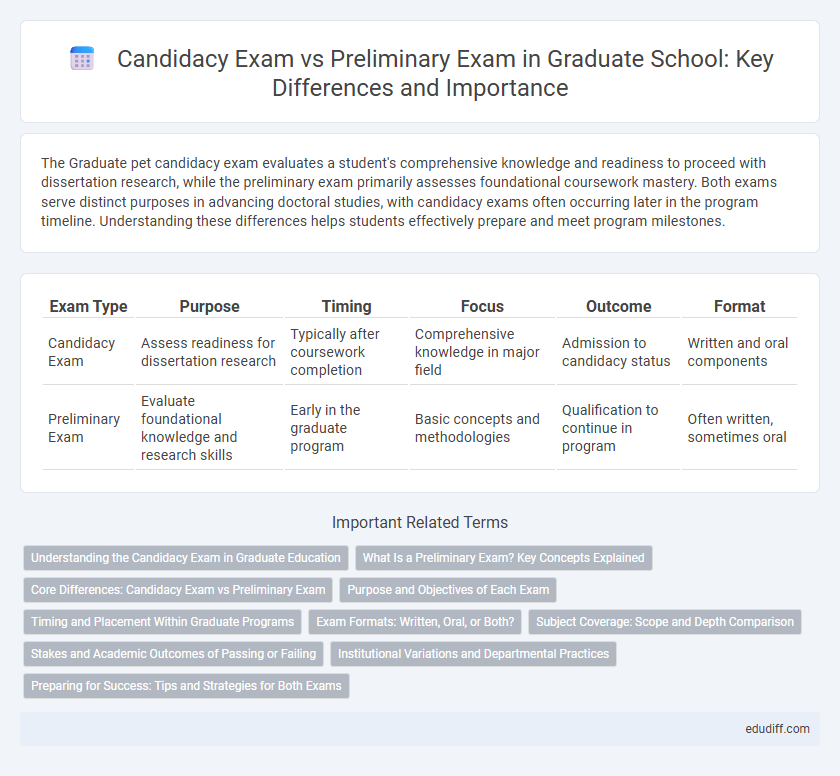The Graduate pet candidacy exam evaluates a student's comprehensive knowledge and readiness to proceed with dissertation research, while the preliminary exam primarily assesses foundational coursework mastery. Both exams serve distinct purposes in advancing doctoral studies, with candidacy exams often occurring later in the program timeline. Understanding these differences helps students effectively prepare and meet program milestones.
Table of Comparison
| Exam Type | Purpose | Timing | Focus | Outcome | Format |
|---|---|---|---|---|---|
| Candidacy Exam | Assess readiness for dissertation research | Typically after coursework completion | Comprehensive knowledge in major field | Admission to candidacy status | Written and oral components |
| Preliminary Exam | Evaluate foundational knowledge and research skills | Early in the graduate program | Basic concepts and methodologies | Qualification to continue in program | Often written, sometimes oral |
Understanding the Candidacy Exam in Graduate Education
The candidacy exam in graduate education serves as a critical assessment to evaluate a student's mastery of core knowledge and readiness for dissertation research. This exam typically covers specialized topics within the field and determines whether the student can progress to the dissertation phase. Unlike preliminary exams, which may test broad foundational skills, the candidacy exam is a focused measure of advanced expertise and research capability.
What Is a Preliminary Exam? Key Concepts Explained
A Preliminary Exam in graduate studies is a comprehensive assessment designed to evaluate a student's mastery of core subject matter before advancing to dissertation research. It tests critical thinking, problem-solving abilities, and foundational knowledge essential for successful candidacy. Passing the Preliminary Exam demonstrates readiness to undertake independent research and contributes significantly to a graduate student's academic progression.
Core Differences: Candidacy Exam vs Preliminary Exam
The Candidacy Exam assesses a graduate student's comprehensive knowledge in their field to qualify for doctoral research, emphasizing mastery of core concepts and readiness for dissertation work. In contrast, the Preliminary Exam primarily evaluates foundational coursework proficiency and determines eligibility to continue in the graduate program. Key differences include the exam timing--typically after coursework for Preliminary versus post-qualifying coursework for Candidacy--and the scope, with the Candidacy Exam focusing more on research potential.
Purpose and Objectives of Each Exam
The Candidacy Exam primarily assesses a graduate student's mastery of core knowledge and readiness to undertake independent research, serving as a gateway to doctoral dissertation work. The Preliminary Exam evaluates foundational understanding and skills in the chosen field, ensuring the student possesses the necessary academic qualifications to progress in the graduate program. Both exams aim to verify competence, but the Candidacy Exam emphasizes research potential while the Preliminary Exam focuses on broad subject proficiency.
Timing and Placement Within Graduate Programs
The Candidacy Exam typically occurs after completing coursework and comprehensive requirements, signaling a transition from coursework to dissertation research in graduate programs. The Preliminary Exam is often administered earlier, serving as a qualifier to determine eligibility for continued study or entry into candidacy. Timing and placement differ by institution and discipline, impacting a student's progression and preparation strategy within the graduate program milestones.
Exam Formats: Written, Oral, or Both?
Graduate candidacy exams typically include both written and oral components to comprehensively assess subject mastery and research readiness. Preliminary exams often emphasize written formats, testing foundational knowledge before advancing to dissertation work. Understanding the specific exam format requirements is crucial for effective preparation and academic progression in graduate studies.
Subject Coverage: Scope and Depth Comparison
Candidacy exams typically cover comprehensive knowledge across a broad range of subjects within a graduate program, ensuring mastery of foundational and advanced topics. Preliminary exams tend to focus on specific subject areas related directly to the student's research focus, emphasizing depth over breadth. This distinction in subject coverage reflects each exam's role in assessing general readiness versus specialized expertise in graduate studies.
Stakes and Academic Outcomes of Passing or Failing
Passing the Candidacy Exam demonstrates mastery of core graduate-level knowledge, granting students the status of PhD candidates and eligibility to begin dissertation research, while failing may require retakes or result in dismissal from the program. The Preliminary Exam serves as an early assessment of research readiness, often influencing continuation in the program and integration into academic seminars, with failure potentially delaying progression or triggering remedial measures. Both exams carry high stakes, directly impacting a graduate student's academic trajectory, funding opportunities, and time-to-degree completion.
Institutional Variations and Departmental Practices
Candidacy exams and preliminary exams often differ significantly across institutions and departments, with some universities using the terms interchangeably while others assign distinct purposes and formats. Departments in STEM fields may emphasize research proposals and technical knowledge in candidacy exams, whereas humanities departments focus more on comprehensive literature reviews and theoretical frameworks in preliminary exams. These institutional variations impact the timing, evaluative criteria, and progression requirements for graduate students advancing toward their doctoral degrees.
Preparing for Success: Tips and Strategies for Both Exams
Preparing for the Candidacy Exam and Preliminary Exam requires focused study plans, effective time management, and consistent review of core materials relevant to your graduate field. Utilize past exam questions, form study groups with peers, and seek guidance from faculty advisors to strengthen your understanding of key concepts and expectations. Emphasizing regular practice, self-assessment, and stress management techniques enhances confidence and performance on both exams.
Candidacy Exam vs Preliminary Exam Infographic

 edudiff.com
edudiff.com